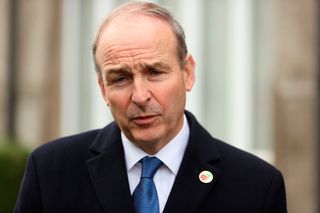Owen Clifford: 'Retail may be evolving but great service remains key to success'
Those predicting the death of the high street should take a closer look at the hard evidence. Stock photo
The future of retail is much debated, but often the way the debate is framed is inherently flawed. It's not a question of physical versus online. The sector cannot be packaged neatly in such a binary manner. The foundation of retail is interaction with the customer.
Leading Irish-owned brands such as SuperValu, Dunnes Stores, Elverys Sports, Carraig Donn and numerous other family-owned retailers nationwide are continuously investing in their stores, their people and their offering, to deliver an excellent customer experience. They have not succumbed to new competition or the threat of online.
Instead of dying, they continue to be reborn and reimagined every day, every year, every decade.
These successful retailers have utilised the 'four Rs' of store investment proactively and effectively - reinvigorate, repurpose, rent-out and right-size - to ensure that they remain relevant and fresh in a competitive marketplace.
Retail is part of our culture; the concept of the marketplace in varying forms and manifestations can be traced back to ancient Greece and Rome, where it was a centre for human interaction and building meaningful customer relationships.
Psychologists tell us that we are, at our core, 'social beings'. We continue to pack out venues to support our favourite sports teams or listen to our favourite bands when we could easily do the same from the comfort of our sofa. Why? Because we value and enjoy the human interaction and overall experience that these events provide.
In turn, we visit physical stores not just to shop but because we value human interaction and the experience that this provides.
They offer an escape from our busy lives and an experience that online shopping cannot replicate: seeing, smelling, trying and testing products, touching them, speaking with knowledgeable sales staff, engaging with other people in-store.
It is this core principle that underpins the future of the physical store. Successful retailers know that their stores need to reflect the vision and values of their customers, creating a positive experience.
Technology is not a threat to the physical store and will never replace the human aspect in retail.
Progressive retailers are embracing technology and driving an omni-channel approach within their stores for the benefit of us, the customers. Physical stores are part of our culture and investment in technology is being used to deliver a customer-centric retail experience, through click-and-collect, electronic shelf labels, real-time pricing, digital receipts/mobile vouchers, in-store virtual dressing rooms, etc. However, the core of the customer experience remains the physical store, and these innovations merely augment and add to the experience.
Numerous international reports point to three key areas for customers in visiting a store and, more importantly, revisiting the store - the 'boomerang effect' as outlined so well by the late Feargal Quinn. These three pillars of customer engagement are: excellent service and standards, accessibility and price.
I have visited over 250 family-owned retail businesses throughout Ireland over the past two years and I continue to emphasise the importance of a balanced customer engagement strategy for their business, that encompasses all three pillars. Indeed, for SMEs competing opposite larger multinational operators, it is imperative that they maintain a strategy across all three strands and are not overly focused on just price. Price is just one element of value, along with quality and provenance of produce, and supporting the customer with their health and wellness agenda.
Progressive retailers recognise that regular investment in their stores is a fundamental element of creating an excellent customer experience. Our own data shows that leading retailers are investing amounts equating to five to 10 weeks of turnover in transforming their stores every two to four years. This equates to 10pc to 20pc of an individual store's annual turnover performance.
A robust investment plan draws on feedback from existing and targeted customers, employees and suppliers. It's an holistic, interactive process ensuring that the retailer remains engaged with the customer and wider community. Smart retailers know a well-planned and executed investment strategy can deliver recurring, significant return on investment. To quote Don Draper from Mad Men: "Success comes from standing out, not fitting in."
However, I have also witnessed retailers spending six-figure sums on store revamps and not receive any uplift in sales or margin.
Without a strategy that has planning and constant evaluation/engagement at its core, a revamp will not deliver an appropriate return on investment for the retailer.
Once the buzz of the official relaunch has taken place, the store will slowly return to the status quo and the retailer will be the latest victim of a 'Cinderella revamp'.
The reality is that the retail landscape is forever changing, but while trends and preferences are cyclical, the delivery of a consistent, excellent customer experience remains at the core of all successful businesses.
More and more e-commerce retailers are complementing their online offerings with physical stores (Amazon and Alibaba being just two examples), and most physical retailers are using online to ensure they remain engaged with their customers.
Commentators signalling the death of the bricks-and-mortar store are driving a negative storyline in respect of the SME retail sector at present.
It's a misguided narrative, based on the evidence to hand, and should be challenged. The future of retail is bright - let's all continue to enjoy the experience.
Owen Clifford is head of retail sector at Bank of Ireland
Join the Irish Independent WhatsApp channel
Stay up to date with all the latest news














